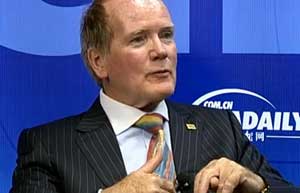FMCG firms told focus on consumer demands
Updated: 2011-09-29 06:51
By Ma Zhenhuan (China Daily)
|
|||||||||
SHANGHAI - FMCG (fast-moving consumer goods) enterprises and retailers must find a mechanism that caters to Chinese consumers' different needs to nurture their "intimacy" toward products and brands, said economists and company executives.
"For FMCG companies, consumer centricity in China is not likely to be about 'trappings' of marketing. It is, first and foremost, about building and continuously reinventing outstanding value for money to keep them on the 'hit parade' of Chinese consumers' shopping list," said Charles Waldman, professor of marketing at the China European International Business School(CEIBS), during a forum CEIBS hosted this month.
Waldman said that after the recent "consumption crisis" in Western economies and its impact on trade, China is briskly migrating from an export-led to a consumption-led society.
To benefit from that trend, FMCG enterprises need to comply with consumers' needs and continuously reinvent their competitive distinction, Waldman said.
The FMCG sector in China has a bright future because the 12th Five-Year Plan (2011-2015) has designated a number of consumer-oriented sectors as areas boost the nation's economy, including FMCG, airlines, food and shopping sectors, he said.
The Chinese are some of the world's most complex consumers, blending characteristics common to modern consumers worldwide with strong Asian cultural traits, he said.
"China's mainstream consumers today have inherited from their parents and grandparents a cautious approach to spending, and become ever smarter in building 'trade-offs' between their quality aspirations and their controlled spending," he said.
Besides, with the popularity of online shopping, Chinese consumers are doing much more research before buying than average consumers in developed economies do, another factor that contributes to the fewer shopping trips Chinese consumers make nowadays.
A research from consulting firm McKinsey & Co in October showed that from 2008 to 2010, the number of weekly shopping trips Chinese consumers made for home and personal care products fell from 0.6 to 0.5, while the average basket grew from 18.42 yuan ($2.85) to 24.10 yuan.
To sum up, Waldman suggested that FMCG companies expend more effort on making their products and services more functional and better-looking to offer consumers outstanding value for their money.
Tom Doctoroff, Greater China CEO of marketing communication agency JWT, said Chinese consumers need assurance from FMCG brands: brand assurance, practical quality assurance and emotional assurance. In promoting their brands, he said, FMCG enterprises must visually convey the benefit of their products, but not exaggeratedly.










